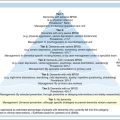Chapter 13 THE MENTAL STATE EXAMINATION
INTRODUCTION
This chapter is devoted to the mental state examination of older people in the community setting. Mental state examination is often referred to as mental status examination in North America. Accurate mental state examination (MSE) with older people is quite an art and the mental health worker needs to obtain some experience before developing proficiency in this art. As noted in Chapter 12, near the beginning of a clinical interview with an older person, it is necessary to make a tactical decision about how much time and effort to devote to taking the history as opposed to undertaking the MSE. In people with moderate or severe cognitive impairment, most of the history will need to be obtained from other informants. In such instances, the mental health worker should concentrate on the MSE during the clinical encounter with the person. Similarly, in cases where the person is highly suspicious or uncooperative, the mental health worker should concentrate initially on the MSE.
In older people it is essential to conduct a detailed cognitive assessment as part of the MSE. This is covered in Chapter 14. Confusingly, one of the more commonly used cognitive assessment tools is called the Mini-Mental State Examination (MMSE) (Folstein et al 1975). The MMSE must not be confused with the MSE, despite the similarity in their acronyms. The MSE is much broader than the MMSE. Because of the importance of the cognitive component of the MSE in older people, this will be dealt with in detail in the following chapter, after discussing the essential features of the MSE in this chapter.
As was noted in Chapter 12, it is often preferable to see the person alone in case domestic violence or other types of elder abuse have been present. It also eliminates the risk that well-meaning supporters will assist the older person with their responses.
CULTURAL ISSUES
In transcultural situations (see Ch 6), it is preferable not to use family members as translators, as family members sometimes modify what the person says to save face or for other reasons. They also often try to make sense of what the person is saying, making it difficult for the mental health worker to identify formal thought disorder (see below). Thus, it is best to use accredited professional medical translators. However, it is important to ascertain the precise dialect that the person speaks before arranging for the translator to be present. Sometimes, there is no time to arrange this because an urgent situation has developed and the mental health worker will have to make do with family translators. However, in such situations, it is usually worthwhile doing a subsequent interview using a professional translator to check initial findings.
DETAILED MENTAL STATE EXAMINATION
Abnormal motor behaviour
Look for evidence of the dyskinetic movements of tardive dyskinesia or of late-stage Parkinson’s disease. In tardive dyskinesia there may be involuntary movements of the face, lips and tongue, or writhing or jerking movements of the trunk or limbs. In Parkinson’s disease there may be jerky or dance-like movements, usually after many years of treatment with L-dopa or other dopamine agonists. A dancing gait is also found in Huntington’s disease.
Level of conscious awareness
The Glasgow Coma Scale (GCS) (Teasdale & Jennett 1974) is the standard measure of impaired consciousness that is used around the world. GCS scores range from 3 (deep coma or death) through to 15 (fully conscious and alert). It consists of three components: best eye response (scored 1–4); best verbal response (scored 1–5); and best motor response (scored 1–6). Scores of 8 or less indicate severe coma, whereas scores of 9–12 indicate moderate coma.
Cooperativeness and rapport
One of the most important tasks of initial encounters with the older person is the development of rapport on which a therapeutic alliance can be built. Empathy with the person in their distress will assist the mental health worker to build rapport. Sometimes, however, empathy is difficult to achieve with a suspicious or angry person. Such individuals are often projecting on to the mental health worker negative feelings that have arisen because of their mental illness or the way they have been treated in the past by important figures in their own lives. In such circumstances, it is important for the worker to try to identify their own countertransference, or psychological reaction, towards the person. This may include unconscious hostile feelings towards the person that do not reflect the actual relationship between the person and the mental health worker. It is difficult to conduct a valid and reliable MSE with an uncooperative older person, so significant effort needs to be devoted to obtaining cooperation from the very beginning of the clinical encounter. Accurate reading of the worker’s own countertransference towards the person will assist with the development of rapport.
Stay updated, free articles. Join our Telegram channel

Full access? Get Clinical Tree





